3PM update:
Senate President Brandon Shaffer and House Speaker Frank McNulty both say they'lll go back to the negotiating table today to try one last time to reach a deal on a Congressional redistricting map.
The House gave final passage to its Republican-backed map earlier today, but concerns about whether it would get a hearing in the Senate brought that chamber to a standstill.
Senate Republicans asked the clerk to read the full text of bills lawmakers were voting on, a parliamentary move akin to a filibuster. Minority leader Mike Kopp said the tactic was needed to force Senate Democrats to take up a House redistricting proposal. That bill is now scheduled for a hearing sometime after four this afternoon. Senate Republicans are planning to offer a new map which they say meets more than 80% of Democrats requirements.
A closed door meeting between Governor John Hickenlooper and lawmakers about the map apparently broke up when members of the media demanded entry. The governor's spokesman says he has no comment on the process at this point.
______________________
Senate Democrats effectively killed their own redistricting bill last night. Leaders said it wasn't worth continuing with a bill that was likely to die in the Republican-controlled House. Lawmakers of both parties now predict the process will end up in court.
______________________
Until yesterday lawmakers seemed to hold out hope, at least publicly, that the two parties could compromise on a redistricting map. Yesterday, hope gave way to pragmatism, and talk of court battles.
The first redistricting debate of the day was actually in the House, where representatives spent hours debating a Republican-backed proposal. It's certain to either be amended or killed by Senate Democrats when it reaches its next chamber, but House Speaker Frank McNulty told lawmakers its important to keep a bill moving through the process in case behind-the-scenes negotiations manage to reach a compromise.
MCNULTY: "We will have a live bill title in the hopes that something might break that allows us to draw Colorado's seven congressional districts and live up to our constitutional obligation to do so. We will miss an historic opportunity to draw these districts if we fail in the next 48-hours. And that is unfortunate."
Word at the capitol is that talks between McNulty, Senate President Brandon Shaffer, and governor John Hickenlooper have ended in stalemate, and McNulty seemed to signal as much, describing negotiations in the past tense. McNulty blames Shaffer for refusing to deal but after the House passed its map, Democratic Representative Dan Pabon disputed that idea.
PABON: "I'm not sure what he's being specific about, but I can tell you that it's not just one person who has to reach an agreement, it's two in this case."
House Democrats have tried at several points in the process to amend the bill to look like their desired redistricting map, without success. When the Senate took up the Democratic proposal yesterday evening, assistant minority leader Bill Cadman told lawmakers that the House votes mean that without some kind of deal between the parties, the effort is doomed.
CADMAN: "Anybody seen 'The Green Mile'? Let's call this the Redistricting Mile, because this is a dead map walking."
Democratic Senators apparently agreed with Cadman – they spent so long praising their redistricting map that they talked right past a midnight deadline to vote on the bill. That means they won’t have time to get the bill through the process before the session ends tomorrow. Taking the podium a few minutes after midnight, Republican Senator Ted Harvey blasted Democrats for stalling.
HARVEY: "I've been down here a long time and to ever see the Democrat majority filibuster their own bill so they don't have to vote on their own bill? That is embarrassing for the citizens of Colorado."
Senate Majority leader John Morse says that McNulty's comments earlier in the day just confirmed his side's belief that no deal is in the offing, and that it's time to prepare for the likely next step – court.
MORSE: "So that's what this is now all about. This turns completely from a legislative process to a judicial process. Not a good thing, but it is the thing that it is."
Morse says that's why Senate Democrats effectively talked their bill to death – they were making the case for their map to a future audience of judges.
MORSE: "Today and tonight was about us creating a record for court."
With the Republican-backed House redistricting bill is still alive and in the process there is still time for a compromise map to pass, if legislative leaders can reach a break through in the by early Wednesday.
If the process goes to court, Republicans and Democrats can both point to judicial precedent to support their vision. Republicans cite a 1982 state Supreme Court decision which required the Western Slope, Eastern Plains, and Denver each be kept whole and in separate districts. The Republican map does those things. Democrats look to the last redistricting process, when a Denver judge chose competitive boundaries for the new Congressional district in suburban Denver. Democrats have drawn a map they say has five competitive seats. Colorado may get a chance to find out which ideas the courts prefer if the session ends without agreement.









